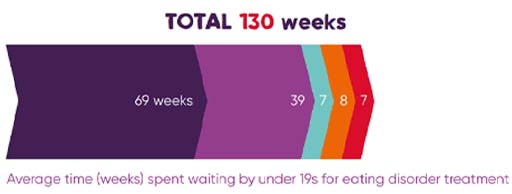4.1 Early intervention
Early intervention in the case of an eating disorder makes a substantial difference in reducing the ongoing distress and improving outcomes. In Figure 6, you’ll see figures from a survey conducted by the UK charity BeatED in 2017, which shows that it took on average 69 weeks before recognising a young person had an eating disorder and it took a further 39 weeks before the young person sought medical help.
Reasons for the initial delays vary. The next activity helps you to consider some of these.
Activity 5: Reasons for a delay in seeking help for an eating disorder
a.
Perceived stigma of mental health problems
b.
Family tensions making communication difficult
c.
Not realising the problem is serious
d.
Not knowing what to say or how to say it
e.
The young person is good at hiding their problem
f.
Lack of information about eating disorders
g.
Denial of the problem
h.
Most people are already well informed and know how to deal with an eating disorder
The correct answers are a, b, c, d, e, f and g.
Discussion
Did you realise that they could all apply except for ‘Most people are already well informed and know how to deal with an eating disorder ‘?
Eating disorders can create tensions and guilt in families and parents may find it difficult to help effectively (Eklund and Salzmann-Erikson, 2016). An interesting study of South Asians living in the UK found that they:
- worried about the stigma associated with mental health
- thought eating disorders could be easily fixed
- worried about privacy and confidentiality within their communities
- warned that these issues were not confined to this ethnic minority.
(Wales et al., 2017).
There is also some evidence that 16-25-year-old males do not recognise an eating disorder in themselves because they consider it a female problem (Räisänen and Hunt, 2014) and that this is a stereotype entrenched in the media (Maclean et al., 2015).
Early identification is important in all mental health problems and it can sometimes prevent the development of unhealthy behaviours such as self-harm, which you will consider next.

